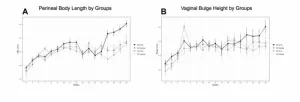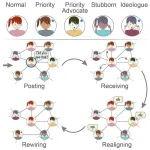(Press-News.org) A Ukrainian researcher has developed a new digital tool for detecting autism and developmental delay in children. Her research has been published in Cambridge University Press journal Cambridge Prisms: Global Mental Health.
The tool incorporates the basic principles of the Kids’ Development Diagnosis and Determining the Risk of Autism (KiDD) methodology, for children aged 1.5 to 6 years old, into mobile app form. It has the potential to help diagnose children more swiftly and efficiently, which could have major positive impacts as early diagnosis of autism helps in preventing lifelong impacts.
This app will also be especially useful in places where medical systems and resources are currently under strain – such as war-torn countries – and support for children with developmental needs risks being delayed or deprioritised.
Olena Iniutina, of the Taras Shevchenko National University of Kyiv, in Ukraine, said: “Signs of autism are observable from early childhood, and the condition persists throughout life and often has an impact on behaviour, personality, and social integration. With early intervention, however, children with autism can be equipped with skills that significantly improve their quality of life and enable greater social adaptation.
“Wars, epidemics, long-term quarantine, financial constraints, and the unavailability of psychological support due to remote living and the financial condition of families are some of the reasons that can lead to children being deprived of the chance to receive well-timed, qualified psychological diagnosis and assistance – and delays in diagnosis increase children’s likelihood of struggling later in life.
“War-torn nations – like my home country of Ukraine – are in desperate need of supporting those with development delays to prevent lifelong impacts. However, tools like this one could also help meet an urgent need in the United Kingdom and United States, where waiting lists for autism diagnoses are extremely long, with parents often waiting over 3 years for their child to receive a formal diagnosis.”
Iniutina ran tests according to the KiDD methodology for more than 3 years, from 2021 to 2024. Standardisation, validation, and testing were conducted on a representative sample of 199 Ukrainian children aged 18–72 months. A psychologist tested 100 children using the KiDD methodology in person, while parents tested 99 children remotely using the mobile app.
To compare the effectiveness of the KiDD methodology, all 100 participants tested by a psychologist also underwent testing using the Kiphard (18-48 months) and Zinnhuber (49-72 months) methods for general development and the M-CHAT (18-30 months) and ATEC (31-72 months) methods for determining the likelihood of a child having autism.
The ability of the KiDD test to identify the likelihood of autism is 84%. The correspondence of these test results to the diagnosis regarding overall development is 98%, and the correspondence of the test results to a child’s diagnosis of autism is 73%. Due
to the late diagnosis of ASD, the percentage of children whose likelihood of autism according to the KiDD test matches the official diagnosis may be higher than 73% when the diagnosis is established.
While the app testing method is not a diagnosis and does not replace a doctor’s diagnosis of autism, it can help parents explain in detail to the doctor which facets of their child’s behaviour and development are atypical. Having this tool for home assessment will be especially valuable for parents unable to access a formal diagnosis, but who are seeking an indication of whether their child is autistic, and to what extent, so that they can figure out how better to support their child.
KiDD methodology also has the potential to be used by psychologists, tutors, educators, teachers, and social workers in children’s hospitals, kindergartens, rehabilitation centres, and schools.
Find out more at cambridge.org/universitypress.
END
Remote tool developed to helped detect autism and developmental delay in children with limited access to specialists
2024-10-22
ELSE PRESS RELEASES FROM THIS DATE:
Texas Accounting Chair Steven Kachelmeier garners coveted award for scholarship
2024-10-22
Texas Accounting Chair Steven Kachelmeier Garners Coveted Award for Scholarship
AUSTIN, Texas — The American Accounting Association (AAA) presented its Lifetime Achievement Award for Behavioral Accounting Research to Steven Kachelmeier, a professor and chair of the Department of Accounting at The University of Texas McCombs School of Business. Kachelmeier, the Thomas O. Hicks Endowed Chair in Business, accepted this prestigious award during the weekend at the association’s 2024 Accounting ...
CABHI launches funding program that ignites innovation to advance healthy aging
2024-10-22
TORONTO, Oct. 22, 2024 – Today, the Centre for Aging + Brain Health Innovation (CABHI), powered by Baycrest launched Ignite, its new funding program to support Canadian innovators designing solutions for older persons. As Canada’s aging population rapidly grows – with nearly 20 per cent of people above the age of 65 – so too will the need for innovations that enhance the lives of older persons, including those impacted by dementia.
Canadian early-stage innovators – including researchers, point-of-care staff, and companies – are developing ...
A fully automated AI-based system for assessing IVF embryo quality
2024-10-22
A new artificial intelligence-based system can accurately assess the chromosomal status of in vitro-fertilized (IVF) embryos using only time-lapse video images of the embryos and maternal age, according to a study from investigators at Weill Cornell Medicine.
The new system, called "BELA,” and described in a paper published Sept. 5 in Nature Communications, is the team’s latest AI-based platform for assessing whether an embryo has a normal (euploid) or abnormal (aneuploid) number of chromosomes—a key determinant of IVF success. Unlike prior AI-based approaches, BELA does not need to consider embryologists' subjective assessments of embryos. ...
Senolytics dasatinib and quercetin for prevention of pelvic organ prolapse in mice
2024-10-22
“This study represents one of the first to evaluate the impact of senolytic agents D+Q on the clinical development of pelvic organ prolapse and expression of proteins associated with cellular senescence in a mouse model.”
BUFFALO, NY- October 22, 2024 – A new research paper was published in Aging (listed by MEDLINE/PubMed as "Aging (Albany NY)" and "Aging-US" by Web of Science), Volume 16, Issue 19 on September 26, 2024, entitled, “Use of the senolytics dasatinib and quercetin for prevention of pelvic organ prolapse in a mouse animal model.”
Pelvic organ prolapse is a common condition among women ...
UCLA efforts to provide prostate cancer treatment in the community gets $6 million boost
2024-10-22
The UCLA Urology department has been awarded $6 million from the California Department of Health Care Services to continue providing vital care and critical services to underinsured and uninsured Californians diagnosed with prostate cancer.
For the next two years, the additional funding will support the 23-year-old IMPACT program—which stands for Improving Access, Counseling, and Treatment for Californians with Prostate Cancer—and extend the program’s reach and duration, ensuring continued support for California’s most vulnerable populations.
Led ...
Study asks: Can cell phone signals help land a plane?
2024-10-22
ALBUQUERQUE, N.M. — Dangling from a weather balloon 80,000 feet above New Mexico, a pair of antennas sticks out from a Styrofoam cooler. From that height, the blackness of space presses against Earth’s blue skies. But the antennas are not captivated by the breathtaking view. Instead, they listen for signals that could make air travel safer.
Researchers from Sandia National Laboratories and Ohio State University are taking experimental navigation technology to the skies, pioneering a backup system to keep an airplane on course when it cannot rely on global positioning system satellites.
More than 15 miles below the floating cooler, cell phone ...
Artificial intelligence is creating a new way of thinking, an external thought process outside of our minds
2024-10-22
The interaction between humans and artificial intelligence is shaping a new thinking system, a new cognitive scheme, external to the human mind, but capable of enhancing its cognitive abilities. This is called System 0, which operates alongside the two models of human thought: System 1, characterized by intuitive, fast, and automatic thinking, and System 2, a more analytical and reflective type of thinking. However, System 0 introduces an additional level of complexity, radically altering the cognitive landscape in which ...
Reaction conditions tune catalytic selectivity
2024-10-22
UPTON, N.Y. — Chemists at the U.S. Department of Energy’s (DOE) Brookhaven National Laboratory have developed a new theoretical framework for more accurately predicting the behavior of catalysts. These collections of atoms lower the energy needed for countless chemical reactions. The study reveals how conditions such as temperature and pressure can change a catalyst’s structure, efficiency, and even the products it makes. The findings are published in the journal Chem Catalysis.
“Our results highlight the significant impact ...
Verified users on social media networks drive polarization and the formation of echo chambers
2024-10-22
When X (formerly Twitter) changed its verification system in 2022, many foresaw its potential to impact the spread of political opinions on the platform. In a modeling study publishing October 22 in the Cell Press journal iScience, researchers show that having verified users whose posts are prioritized by the platform’s algorithms can result in increased polarization and trigger the formation of echo chambers. Because X’s new verification system allows almost anybody to become verified, this side effect could be taken advantage of by users wishing to manipulate others’ opinions, the researchers say.
“Our findings confirm ...
Get a grip: The best thumb position for disc launch speed and spin rate
2024-10-22
WASHINGTON, Oct. 22, 2024 – Disc golf is a sport growing in popularity, but there hasn’t been much research into the best techniques – until now.
Researcher Zachary Lindsey and his team studied professional and amateur disc golf players in Georgia to analyze the effect of thumb grip on disc-throwing.
“Participants were eager and excited to engage in the study, as there is clearly a thirst for scientific evidence and data to drive progress in the sport so that disc golf enthusiasts can improve their game in recreational and competitive contexts,” ...




